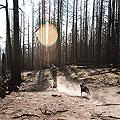Timberline Mountain Bike Trails and Skills Park
Adobe Acrobat File (PDF), 295 Kb
3/26/13
Adobe Acrobat File (PDF), 97 Kb
5/3/10
***UPDATE!See our flickr page for groundtruthing photos of this proposal http //www.flickr.com/photos/barkformthood/sets/72157629484821335/*** In February 2013 Bark joined with conservation and quiet recreation allies in filing an administrative appeal with the Forest Service challenging the agency's approval of the Timberline Mt. Bike Park. The appeal challenges the Forest Service for unfounded conclusions regarding the sediment impacts to fish-bearing streams, questions the assumptions asserted by the agency regarding outcomes of planned and previous restoration and mitigation efforts, and identifies a procedural flaw by which the Forest Service willingly ignores additional plans by the private company managing Timberline (RLK) to further expand the area as identified clearly in RLK's Master Plan documents. Bark supports mountain bike access in Mt. Hood National Forest and we have worked for the past five years to create more bike access to Mt. Hood through road-to-trail conversions in the programmatic road decommissioning process. Mt. Hood National Forest is home to a network of 4,000 miles of roads built by a legacy of logging in the area that represents an unmanageable economic burden to the Forest Service and generates tons of sediment of run-off that imperils threatened salmon habitat every year. In its 1999 Access and Travel Management Plan, the Forest Service itself identified that 49 per cent of the road system in Mt. Hood National Forest should be decommissioned to relieve the ecological and economic burden it poses. Bark has gathered allies, including recreationists and mountain bike advocacy groups, to successfully lobby congress to allocate Legacy Roads and Trails funding to manage this road network and to convert unneeded and unmanaged roads into hiking and biking trails. Despite our best efforts the Forest Service has refused to use this strategic opportunity to create mountain bike access in a manner that addresses the ecological and economic harm caused by roads in Mt. Hood National Forest. When the Timberline Mountain Bike Trails and Skills Park was proposed (and later approved) to include 17-mile network of lift assisted downhill trails, Bark identified various ecological concerns regarding the project. Those concerns range from the impact to sensitive and unique alpine soils, the introduction of invasive species and resulting management with herbicides, run-off of sediment from the trails into the headwaters of still creek which provides critical habitat for threatened salmon, interruption of summer range for wildlife in the area, and the likelihood of logging to occur in conjunction with expanding and safe-proofing the proposed bike trails. While our ecological concerns are significant, our frustrations with this project are heightened by the history of the Forest Service refusing to create bike access through road-to-trail conversions in the programmatic road decommissioning process which would simultaneously address the ecological harm of a crumbling road network throughout Mt. Hood National Forest, relieve the agency of the economic burden of an unmanageable road system, and create ecologically responsible mountain bike access throughout the forest. Bark sees the potential for quiet recreation access, including mountain bikes, to Mt. Hood National Forest to be a driver for resolving the ongoing ecologic and economic problems caused by an unmanageable network of roads. The Timberline Mountain Bike Trails and Skills Park is generating a type of access that exacerbates, rather than alleviates, the ecological harm to Mt. Hood watersheds and does nothing to relieve the economic burden of an expansive road system on the Forest Service. This is a missed opportunity.
- Bike Portland: The Case Against the Timberline Mountain Bike Park
RLK’s proposal to use Timberline’s slopes for mountain bike trails is not the bike-friendly proposal you might think - that is, if bikes are an idea in line with your values of environmental stewardship, local power and equity.
More... - KGW: Mountain Bike Park at Timberline approved
The U.S. Forest Service recently approved Timberline Ski Area’s plan to build a mountain biking “skills park” on Mount Hood.
More... - Downhill bike park could hurt environment near Timberline
Timberline's proposal to build a new lift-assisted mountain bike park will harm water quality, wildlife habitat, and cause soil erosion.
More... - Missing on Mount Hood: a vision for the future
Oregonian Op-Ed by Dennis Chaney
More... - A bike park is incompatible with Timberline Lodge
One Oregonian speaks out against the change of Timberline Lodge from cultural icon to extreme sport destination
More...
General Info
- District: Zigzag
Updated 3/9/11










